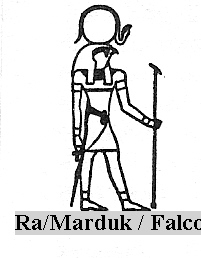Published: Naville, Mythe d’Horus (with French translation).
Translated: Wiedemann, Religion of the Ancient Egyptians, p. 69.
The account of the war between Horus and Set is sculptured on the inner part of the west side of the girdle-wall of the temple of Edfu. The whole temple is dedicated to Horus; though undoubtedly an early foundation, the present structure dates only to the Ptolemaic period. It was begun by Ptolemy III Euergetes I, and took 180 years to build and decorate. The girdle-wall, on which these scenes and inscriptions were sculptured, was built and decorated about 100 B.C., either by Soter II or Alexander I.
The temple was excavated by Mariette, and is the most perfect in condition of all the temples in Egypt, for with the exception of the wanton multilation of the faces, probably by Christian fanatics, both building and sculpture are untouched save by time.
The inscription appears to give in legendary form a fairly accurate account of tribal battles of a very early period. Though the actual inscription is of a late date, many primitive ideas are preserved, especially in the hymns of the women to Horus. “Eat ye the flesh of the vanquished, drink ye his blood,” is not a sentiment of the civilisation of Ptolemaictimes. Human sacrifice, however, appears to have been practised in Egypt at all periods. Harvest victims were burnt at Eleithyapolis (El Kab). Amasis II of the xxvith dynasty put an end to human sacrifice at Heliopolis; Diodorus says that red-haired men were offered up at the sepulchre of Osiris; as the king was the incarnate Osiris, this would mean that human sacrifices were made at the royal graves, probably during the funeral ceremonies. The Book of the Dead also continually alludes to human sacrifice. At Edfu an altar was found sculptured with representations of offerings in which human beings are the victims. Small figures, carved in the round, are known, which are in the form of bound captives; and show probably the method of binding the victim; the legs are bent at the knees, and the feet bound to the thighs; the arms are bent at the elbows and securely lashed to the body. This is not the ordinary way of binding a prisoner, but is a special method reserved probably for a human victim. The figures represent sometimes men, sometimes women.
Judging by the representations and scenes on the girdle-wall, a “mystery-play” was acted in the temple of Edfu, the Pharaoh playing the principal part, that of Horus. In early times it seems more than probable that Set, or the Ally of Set, was played by a human being, who was actually killed during the performance. When the custom of human sacrifice begins to die out, the human victim is often replaced by an animal. This is the case at Edfu, where Set is called a hippopotamus and represented as a pig.
(Texts: All Artifacts, Color Coding, & Writings in Bold Type With Italics Inside Parenthesis, are Added by Editor R. Brown, not the Authors, Translators, or Publishers!)
(gods in blue)
 (marduk / Ra)
(marduk / Ra)
It was in the three hundred and sixty-third year of the reign of the God Ra
Horakhti upon earth that the great war happened between Horus and Set.
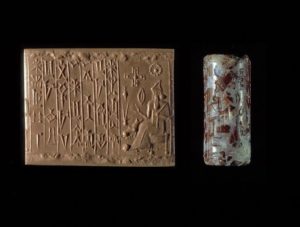 (Marduk / Ra, father to feuding sons)
(Marduk / Ra, father to feuding sons)
The Majesty of the God Ra, whom men call Ra-Horakhti also,
was in Nubia with his army, a great and innumerable multitude of soldiers,
footmen and horsemen, archers and chariots.
He came in his Boat upon the river; the prow of the Boat was of palm-wood,
its stern was of acacia-wood, and he landed at Thest-Hor, to the east of the Inner Waters.
 (Horus)
(Horus)
And to him came Horus of Edfu, he whose name is Harpooner and Hero,
seeking for that Wicked One, Set, the murderer of Osiris (Marduk / Ra‘s son).
Long had he sought, but Set had ever eluded him.
The Majesty of Ra (Marduk) had gathered his forces,
for Set had rebelled against him, and Horus was glad at the thought of battle,
for he loved an hour of fighting more than a day of rejoicing.
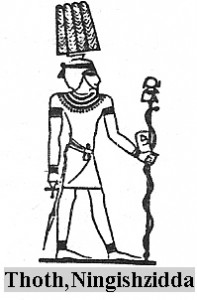 (Marduk’s brother Ningishzidda, God of Knowledge)
(Marduk’s brother Ningishzidda, God of Knowledge)
He entered into the presence of Thoth (Ningishzidda), the twice great, god of magic,
and Thoth gave him the power to change himself into a great winged disk,
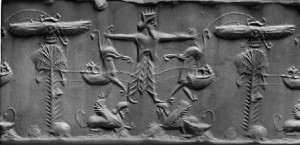 (Marduk & winged sky-disc)
(Marduk & winged sky-disc)
a disk that glowed like a ball of fire, with great wings on either side
like the colors of the sky at sunset when the blue shades from dark to light, and is shot with gold and flame.
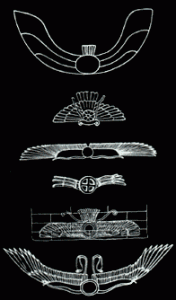

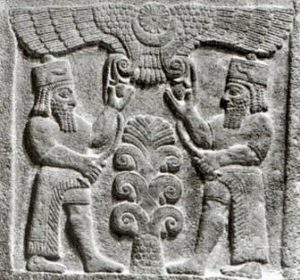
Men try to copy these hues when they carve the winged disk above the temple-doors,
or make it into a breast-ornament of gold inlaid with turquoise and carnelian and lazuli.
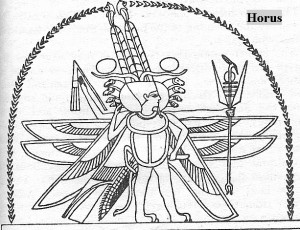 (Horus)
(Horus)
Thus Horus, as a great winged disk (alien tech), sat on the prow of the Boat of Ra (alien tech),
and his splendor flashed across the waters and fell upon his foes as they lay in ambush.
Upon his glorious wings he rose into the air, and against his crafty enemies he made a curse,
a curse terrible and fear-striking, saying,
“Your eyes shall be blinded, and ye shall not see; and your ears shall be deaf, and ye shall not hear.”
And at once, when each man looked at his neighbor, he saw a stranger;
and when he heard his own familiar mother-tongue it sounded like a foreign language,
and they cried out that they were betrayed, and that the enemy had come among them.
They turned their weapons each against the other,
and in the quickness of a moment many had ceased to live, and the rest had fled,
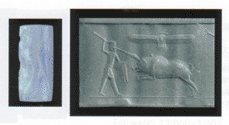 (wild boar & sky-disc above)
(wild boar & sky-disc above)
while over them flew the gleaming Disk (alien technologies) watching for Set.
But Set was in the marshes of the North Country and these were but his advance-guard.
Then Horus flew back to Ra, and Ra embraced him
and gave him a draught of wine mixed with water.
And to this day men pour a libation of wine and water to Horus at this place in remembrance.
When Horus had drunk the wine, he spoke to the Majesty of Ra and said,
“Come and see thine enemies, how they lie overthrown in their blood.”
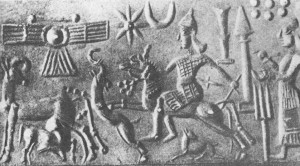
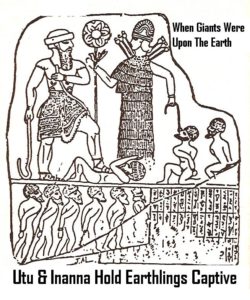
(Astarte / Inanna, Mistress of Horses: Utu & Inanna with captive earthlings)
Ra came, and with him came Astarte (Inanna), Mistress of Horses, driving her furious steeds;
and they saw the corpse-strewn field where the army of Set had slain one another.
Now this is the first encounter in the South, but the last great battle was not yet.
Then the associates of Set came together and took counsel,
and took upon themselves the likeness of crocodiles and hippopotamuses,
for these great beasts can live under water and no human weapon can pierce their hides.
They came up the river, the water swirling behind them,
and rushed upon the Boat of Ra (alien technologies) to overturn it.
But Horus had gathered together his band of armorers and weapon-smiths,
and they had prepared arrows and spears of metal, smelted and welded,
hammered and shaped, with magical words and spells chanted over them.
When the fierce beasts came up the river in waves of foam,
the Followers of Horus drew their bowstrings and let fly their arrows,
they cast their javelins, and charged with their spears.
And the metal pierced the hides and reached the hearts,
and of these wicked animals six hundred and fifty were slain, and the rest fled.
Now this is the second encounter in the South, but the last great battle was not yet.
The associates of Set fled, some up the river and some down the river;

their hearts were weak and their feet failed for fear of Horus, the Harpooner, the Hero.
And those whose faces were towards the South Land fled fastest,
for Horus was at their back in the Boat of Ra (alien technology);
and with him came his Followers, their weapons in their hands.
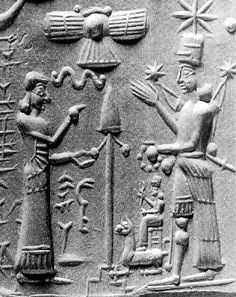 (Ninhursag, Inanna, & Bau seated)
(Ninhursag, Inanna, & Bau seated)
At the south-east of Denderah, the city of Hathor (Ninhursag),
Horus saw the enemy, and he rushed upon them with his Followers,
while Ra and Thoth (Ningishzidda) watched the conflict as they waited in the Boat.
Then said the Majesty of Ra to Thoth, “See, how he wounds his enemies!
See, how Horus of Edfu carries destruction among them!”
And afterwards men built a shrine in this place in remembrance of the fight,
and the Gods in the shrine were Ra and Min and Horus of Edfu.
Now this is the third encounter in the South, but the last great battle was not yet.
Then quickly they turned the Boat, and swiftly was it carried downstream,
following the fugitives, whose faces were towards the North Land.
For a night and a day they followed after, and at the north-east of Denderah Horus saw them.
And he made haste, he and his Followers, and fell upon them, and slew them.
Great and terrible was the slaughter as he drove them before him.
Thus was destroyed Set‘s army in the South in four great encounters,
but the last great battle was not yet.
Now the allies of Set turned their faces towards the lake and towards the marshes of the sea.
Horus came behind them in the Boat of Ra,
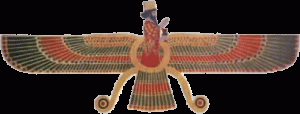 (Ashur in winged sky-disc)
(Ashur in winged sky-disc)
and his form was the form of a great winged disk (alien technologies);
and with him came his Followers, their weapons in their hands.
Then Horus commanded silence, and silence was upon their mouths.
Four days and four nights were they upon the water seeking the enemy.
But none did they find, for their foes had turned their shapes
into the shapes of crocodiles and hippopotamuses, and lay hidden in the water.
On the morning of the fifth day Horus saw them; at once he gave battle,
and the air was filled with the noise of the combat,
while Ra and Thoth watched the conflict as they waited in the Boat.
Then the Majesty of Ra cried aloud when he saw Horus like a devouring flame upon the battlefield,
“See, how he casts his weapon against them, he kills them,
he destroys them with his sword, he cuts them in pieces, he utterly defeats them!
See and behold Horus of Edfu!”
At the end of the fight Horus came back in triumph
and he brought one hundred and forty-two prisoners to the Boat of Ra.
Now this is the first encounter in the North, but the last great battle was not yet.
For the enemies, who were upon the Northern Waters,
turned their faces towards the canal to reach the sea,
and they came to the Western Waters of Mert, where the Ally of Set had his dwelling.
Behind them followed Horus, equipped with all his glittering weapons (alien tech),
and he went in the Boat of Ra, and Ra was in the Boat with eight of his train.
They were upon the Northern Canal, and backwards and forwards they went,
turning and re-turning, but nothing did they see or hear.
Then they went northward for a night and a day and they came to the House of Rerhu.
There Ra spoke to Horus and said,
“Behold, thy enemies are gathered together at the Western Waters of Mert, where dwell the Allies of Set.”
And Horus of Edfu prayed the Majesty of Ra to come in his Boat against the Allies of Set.
Again they traveled to the northwards, where the never-setting Stars wheel round a certain point in the sky,
and on the banks of the Western Waters of Mert were the Allies of Set, ready for battle.
Then Horus of Edfu delayed not a moment, but rushed upon the foe,
and with him came his Followers, their weapons in their hands.
Death and destruction they dealt to right and to left till the enemy fled before them.
When the conflict was over, they counted the prisoners; three hundred and eighty-one were taken,
and these Horus slew before the Boat of Ra, and their weapons he gave to his Followers.
Now this is the second encounter in the North, but the last great battle was not yet.
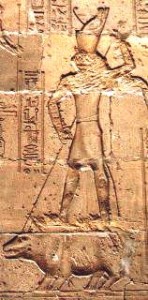 (Seth upon his pig symbol)
(Seth upon his pig symbol)
And now, at last, Set himself came forth from his hiding-place.
Fierce and savage he is, cunning and cruel; in his nature like a beast of prey, without ruth or pity;
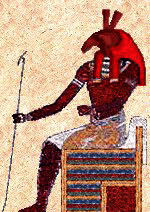 (Seth upon his throne)
(Seth upon his throne)
and men make his image with the head of a wild beast, for human feeling is to him unknown.
From his hiding-place he came forth and he roared terribly.
The earth and the heavens trembled at the sound of his roaring and at the words which he uttered,
for he boasted that he would himself fight against Horus
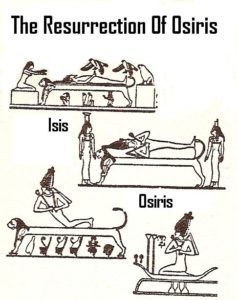
and destroy him as he had destroyed Osiris (Ashur).
The wind bore the words of his boasting to Ra,
and Ra said to Thoth the twice great, Lord of Magic and Wisdom,
“Cause that these high words of the Terrible One be cast down.”
Then Horus of Edfu sprang forward and rushed at his enemy, and a great fight raged.
Horus cast his weapon and killed many, and his Followers fought also and prevailed.
Out of the dust and the noise of the combat came Horus, dragging a prisoner;
and the captive’s arms were bound behind him,
and the staff of Horus was tied across his mouth so that he could make no sound,
and the weapon of Horus was at his throat.
Horus dragged him before the Majesty of Ra.
And Ra spoke and said to Horus, “Do with him as thou wilt.”
Then Horus fell upon his enemy, and struck the weapon into his head
and into his back, and cut off his head, and dragged the body about by the feet,
and at last he cut the body into pieces.
Thus did he treat the body of his adversary as Set had treated the body of Osiris.
This took place on the seventh day of the first month
of the season when the earth appears after the inundation.
And the lake is called the Lake of Fighting to this day.
Now this is the third encounter in the North. but the last great battle was not yet.
For it was the Ally of Set whom Horus had slain, and Set himself was still alive,
and he raged against Horus as a panther of the South.
And he stood up and roared in the face of heaven, and his voice was the voice of thunder,
and as he roared he changed himself into a great snake, and entered into the earth.
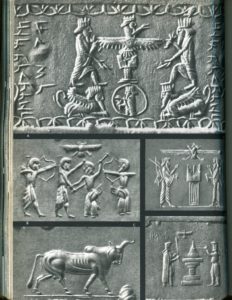
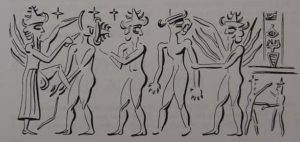 (gods vrs. gods)
(gods vrs. gods)
None saw him go and none saw him change, but he was fighting against the Gods,
and by their power and knowledge are they aware of what comes to pass, though no man tells them.
And Ra said to Horus, “Set has transformed himself into a hissing snake and has entered the earth.
We must cause that he never comes forth; never, never no more!”
The associates of Set took courage, knowing that their leader was alive,
and they assembled again, and their boats filled the canal.
The Boat of Ra went against them,
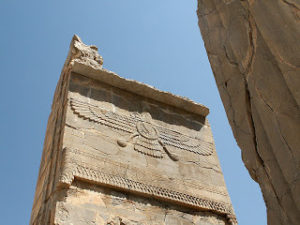
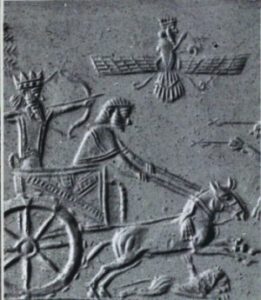 (glory of the great winged disc)
(glory of the great winged disc)
and above the Boat shone the glory of the great winged Disk (alien technologies).
When Horus saw the enemy gathered together in one place,
he drove at them and routed them and slew them without number.
Now this is the fourth encounter in the North, but the last great battle was not yet.
Then Horus of Edfu remained in the Boat of Ra upon the canal for six days and six nights,
watching for the enemy, but he saw none, for they lay as corpses in the water.
And to this day men make ceremonies in remembrance of the Battles of Horus
on the first day of the first month of the inundation,
on the seventh day of the first month of the appearing of the earth after the inundation,
and on the twenty-first and twenty-fourth days of the second month of the earth’s appearing.
These days are kept holy at Ast-abt, which is at the south side of Anrudef,
where is one of the graves of Osiris.
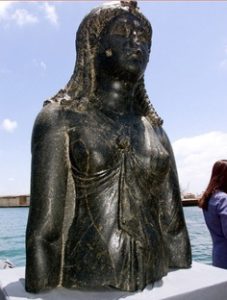 (Isis, spouse to Osiris)
(Isis, spouse to Osiris)
And Isis made magical spells round Anrudef that no enemy might come near it;
and the priestess of Anrudef is called “The Lady of Spells” to this day in remembrance;
and the waters are called “The Waters of Seeking,” for there it was that Horus sought for his foe.
And Horus sent out his Followers, and they hunted down the enemy,
and brought in prisoners; one hundred and six from the East and one hundred and six from the West.
These they slew before Ra in the sanctuaries.
Then Ra gave to Horus and his fighters two cities which are called the Mesen-cities to this day,
for the Followers of Horus are Mesenti, the Metalworkers.
In the shrines of the Mesen-cities Horus is the God,
and his secret ceremonies are held on four days in the year.
Great and holy are these days in the Mesen-cities, for they are in remembrance of the Battles of Horus
which he fought against Set, the murderer of Osiris (father to Horus).
Now these enemies, they gathered again in the East, and they traveled towards Tharu.
Then was launched the Boat of Ra to follow after them,
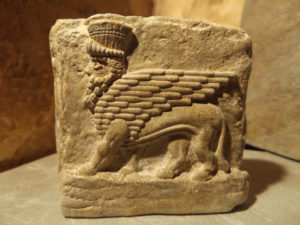 (Horus)
(Horus)
and Horus of Edfu transformed himself into the likeness of a lion with the face of a man;
his arms were like flint, and on his head was the Atef-crown,
which is the white diadem of the South Land with feathers and horns,
and on either side a crowned serpent.
And he hastened after his enemies, and defeated them,
and brought of prisoners one hundred and forty-two.
Then said Ra to Horus of Edfu, “Let us journey northwards to the Great Green Waters,
and smite the foe there as we have smitten him in Egypt.”
Northwards they went, and the enemy fled before them, and they reached the Great Green Waters,
where the waves broke on the shore with the noise of thunder.
Then Thoth arose and he stood in the midst of the Boat,
and he chanted strange words over the boats and barges of Horus and his Followers,
and the sea fell calm as the sound of the words floated across its waves.
And there was silence on the Great Green Waters, for the wind was lulled,
and naught was in sight save the boats of Ra and of Horus.
Then said the Majesty of Ra, “Let us sail round the whole extent of the land, let us sail to the South Land.”
And they knew that Ra was aware of the enemy.
They made haste and sailed to the South Land by night, to the country of Ta-kens,
and they came to the town of Shaïs, but until they reached Shaïs they saw naught of any enemy.
Now Shaïs is on the border of Nubia, and in Nubia were the guards of the enemy.
 (winged Horus)
(winged Horus)
Then Horus of Edfu changed himself into a great winged Disk with gleaming pinions outspread,
and on either side of him came the goddesses Nekhbet and Uazet,
and their form was the form of great hooded snakes with crowns upon their heads;
on the head of Nekhbet was the white crown of the South Land,
on the head of Uazet was the red crown of the North Land.
And the Gods in the Boat of Ra cried aloud and said,
“See, O Thou who art twice great, he has placed himself between the two goddesses.
Behold how he overthrows his adversaries and destroys them.”
Now this is the encounter in Nubia, but the last great battle was not yet.
Then came Ra in his Boat and he moored at Thest-Hor, and he gave commandment
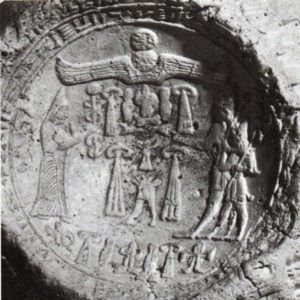 (great winged sky-disc)
(great winged sky-disc)
that in every temple throughout the Two Lands men should carve the Winged Disk,
and on the right and left of the Disk should be Nekhbet and Uazet
as great hooded snakes with crowns upon their heads.
And the temple at the point of Thest-Hor is called “The House of Horus in the South”
to this day in remembrance, and a great offering is made there to Ra and Horus.
And Ra gave to Horus the province of the House of Fighting,
and Ast-Abt, and the Mesen-cities of the East and the West,
and Edfu of the North, and Tharu, and Gauti, and the Sea of Sailing,
and Upper Shasu, and Edfu-of-the-House-of-Ra.
And from the lake south of Edfu-of-the-House-of-Ra
they bring water to the two Houses of the King on the day of the Sed-festival.
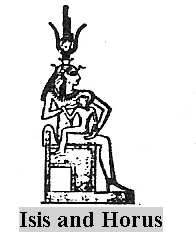 (mother Isis & son Horus)
(mother Isis & son Horus)
And Isis carried Ar-stone of sand to Thest-Hor—Ar-stone of the Star was it;
and in every place in the South Land to which Horus went, there is Ar-stone found to this day.
Now some say that the last great battle is still to come,
and that in the end Horus will kill Set, and that Osiris and all the Gods
will reign on earth when their enemy is utterly destroyed.
But others say that the battle is already ended and that Horus slew the great
and wicked Foe who had wrought misery and calamity to all.
And this is what they say: After months and years Horus the Child grew to manhood.
Then came Set with his allies, and he challenged Horus in the presence of Ra,
And Horus came forth, his Followers with him in their boats, with their armor,
and their glittering weapons with handles of worked wood, and their cords, and their spears.
And Isis made golden ornaments for the prow of the boat of Horus (alien tech),
and she laid them in their places with magic words and spells, saying,
“Gold is at the prow of thy boat, O Lord of Mesen,
Horus, Chieftain of the boat, the great boat of Horus, the boat of rejoicing.
May the valor of Ra, the strength of Shu, power and fear be around thee.
Thou art victorious, O son of Osiris, son of Isis, for thou fightest for the throne of thy father.”
Then Set took upon himself the form of a red hippopotamus, great and mighty,
and he came from the South Land with his Allies, traveling to the North Land to meet Horus of Edfu.
And at Elephantine, Set stood up and spoke a great curse against Horus of Edfu and against Isis, and said,
“Let there come a great wind, even a furious north-wind and a raging tempest”;
and the sound of his voice was like thunder in the East of the sky.
His words were cried from the southern heaven and rolled back to the northern heaven,
a word and a cry from Set, the enemy of Osiris and the Gods.
At once a storm broke over the boats of Horus and his Followers, the wind roared,
and the water was lashed into great waves, and the boats were tossed like straws.
But Horus held on his way; and through the darkness of the storm
and the foam of the waves gleamed the golden prow like the rays of the sun.
And Horus took upon himself the form of a young man; his height was eight cubits;
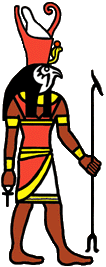 (Horus)
(Horus)
in his hand he held a harpoon, the blade was four cubits, the shaft twenty cubits,
and a chain of sixty cubits was welded to it.
Over his head he brandished the weapon as though it were a reed,
and he launched it at the great red hippopotamus which stood in the deep waters,
ready to destroy Horus and his Followers when the storm should wreck their boats.
And at the first cast the weapon struck deep
into the head of the great red hippopotamus and entered the brain.
Thus died Set, that great and wicked One, the enemy of Osiris and the Gods.
And to this day the priests of Horus of Edfu, and the King’s daughters,
and the women of Busiris and the women of Pé chant a hymn and strike the drum for Horus in triumph.
And this is their song: “Rejoice, O women of Busiris! Rejoice,
O women of Pé! Horus has overthrown his enemies!
“Exult, dwellers in Edfu! Horus, the great God, Lord of heaven, has smitten the enemy of his father!
“Eat ye the flesh of the vanquished, drink ye his blood, burn ye his bones in the flame of the fire.
Let him be cut in pieces, and let his bones be given to the cats, the fragments of him to the reptiles.
“O Horus, the Striker, the great One of Valor, the Slayer, the Chief, of the Gods,
the Harpooner, the Hero, the only begotten, Captor of captives, Horus of Edfu, Horus the Avenger!
“He has destroyed the wicked One,
he has made a whirlpool with the blood of his enemy, his shaft has made a prey.
Behold ye, see ye Horus at the prow of his boat. Like Ra, he shines on the horizon.
He is decked in green linen, in binding linen, in fine linen and byssus.
The double diadem is upon thy head, the two serpents upon thy brow,
O Horus the Avenger! “Thy harpoon is of metal, the shaft is of the sycomore of the desert,
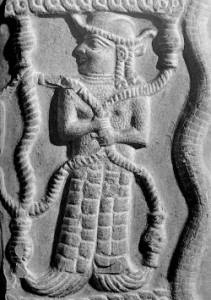 (Ninhursag / Hathor)
(Ninhursag / Hathor)
the net is woven by Hathor (Ninhursag) of the Roses.
Thou hast aimed to the right, thou hast cast to the left.
We give praise to thee to the height of heaven, for thou hast chained the wickedness of thine enemy.
We give praise to thee, we worship thy majesty, O Horus of Edfu, Horus the Avenger!”
 (wild boar under attack with observer above in his winged sky-disc)
(wild boar under attack with observer above in his winged sky-disc)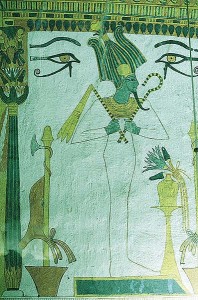 (giant alien gods of Mesopotamia & Egypt)
(giant alien gods of Mesopotamia & Egypt)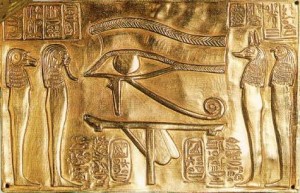 (eye of Horus, symbol widely in use today)
(eye of Horus, symbol widely in use today)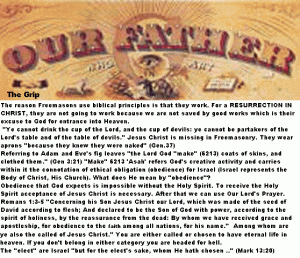 (alien blue eye of Horus)
(alien blue eye of Horus)

